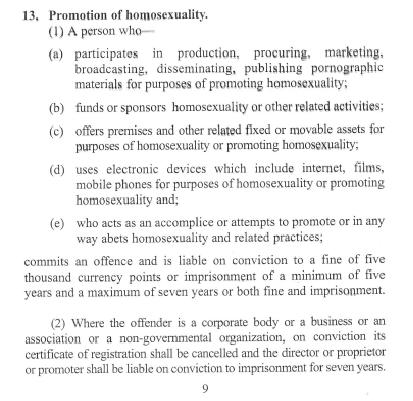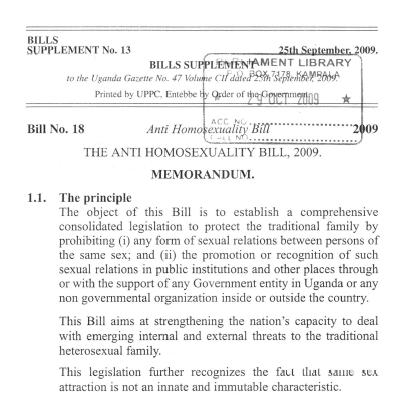Stephen Tashobya, chair of the Legal and Parliamentary Affairs Committee of the Ugandan Parliament, told me yesterday that he had not scheduled consideration for the Anti-Homosexuality Bill. Asked if his committee would write a new report, or stick with the report issued during the last Parliament, Tashobya declined to say. “The committee will have a say on that and we will meet soon to decide how to proceed with all of the bills returned to the committee,” Tashobya explained.
When asked if he planned to have the anti-gay bill back to the floor of the Parliament within the required 45 day period, Tashobya expressed some reservations that he could guarantee that time table. He noted, “We have many bills which have a high priority, such as the Marriage and Divorce bill and other bills on commerce.”
Parliament rules require bills sent to committee to be acted on and returned for consideration within 45 days. Last year, Speaker Rebecca Kadaga warned committee chairs that they could face unspecified sanctions if this rule was not kept.
According to Parliament’s rules (see below), Tashobya could ask Parliament for more time if the committee has not prepared the necessary report within 45 days. At that point, Parliament could grant or decline the request. If the request is declined, Parliament could act on the bill at that point. If an extension is granted, the bill will be considered at the end of that period whether or not the committee’s work is complete.
When asked if he had been pressured by the Executive branch to go slow on the anti-gay bill, Tashobya said he was unable to comment.
Tashobya, who was not at Parliament the day the bill was tabled, said he is aware that the bill has wide support among the MPs.
From Uganda’s Rules of Parliamentary Procedures
125. Delays with Bills
(1) Subject to the Constitution, no Bill introduced in the House shall be with the Committee for consideration for more than forty-five days.
(2) If a Committee finds itself unable to complete consideration of any Bill referred to it in sub-rule (1), the Committee may seek extra time from Parliament.
(3) Where extra time is not granted or upon expiry of the extra time granted under subrule (2), the House shall proceed to deal with the Bill without any further delay.

